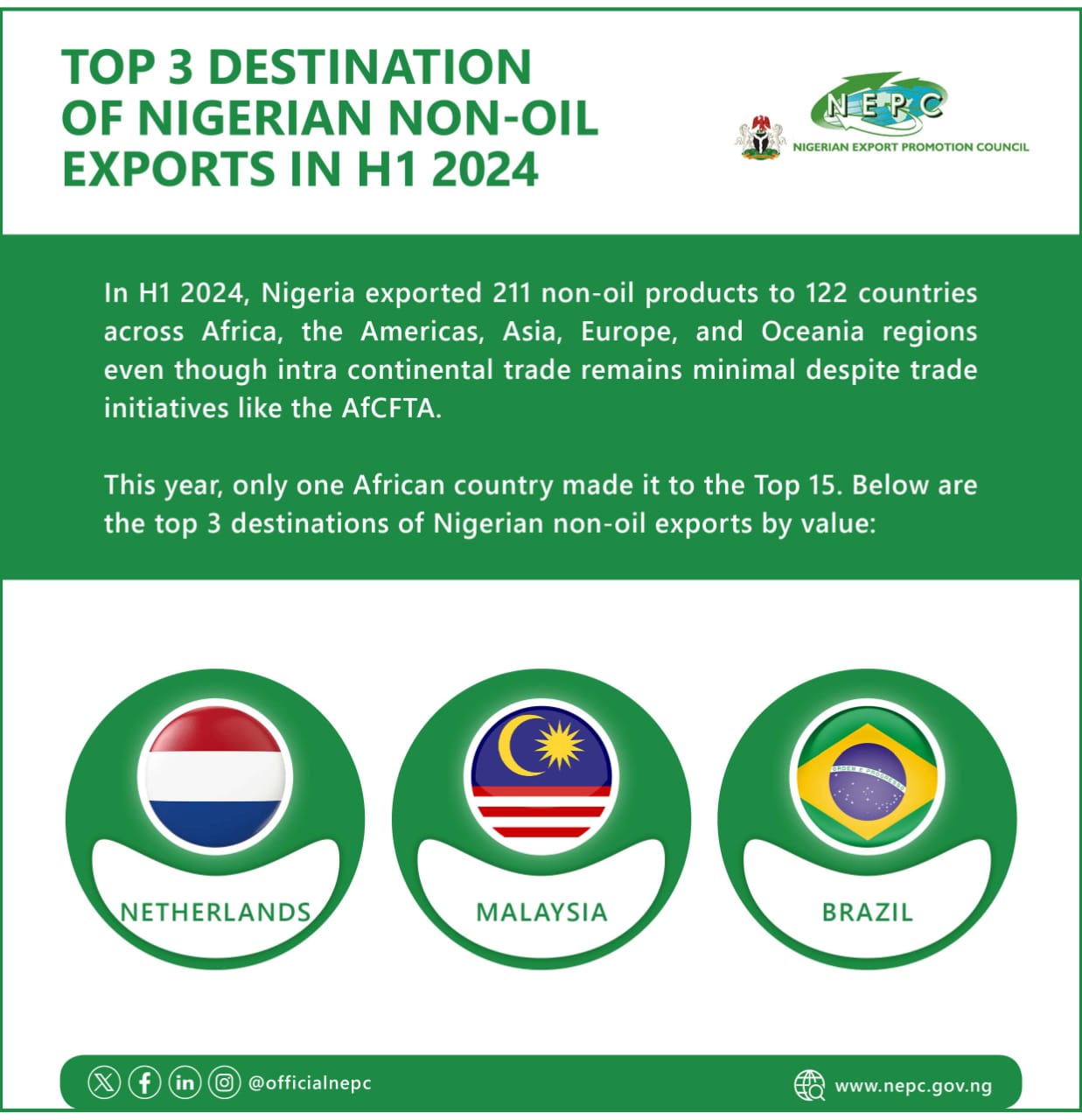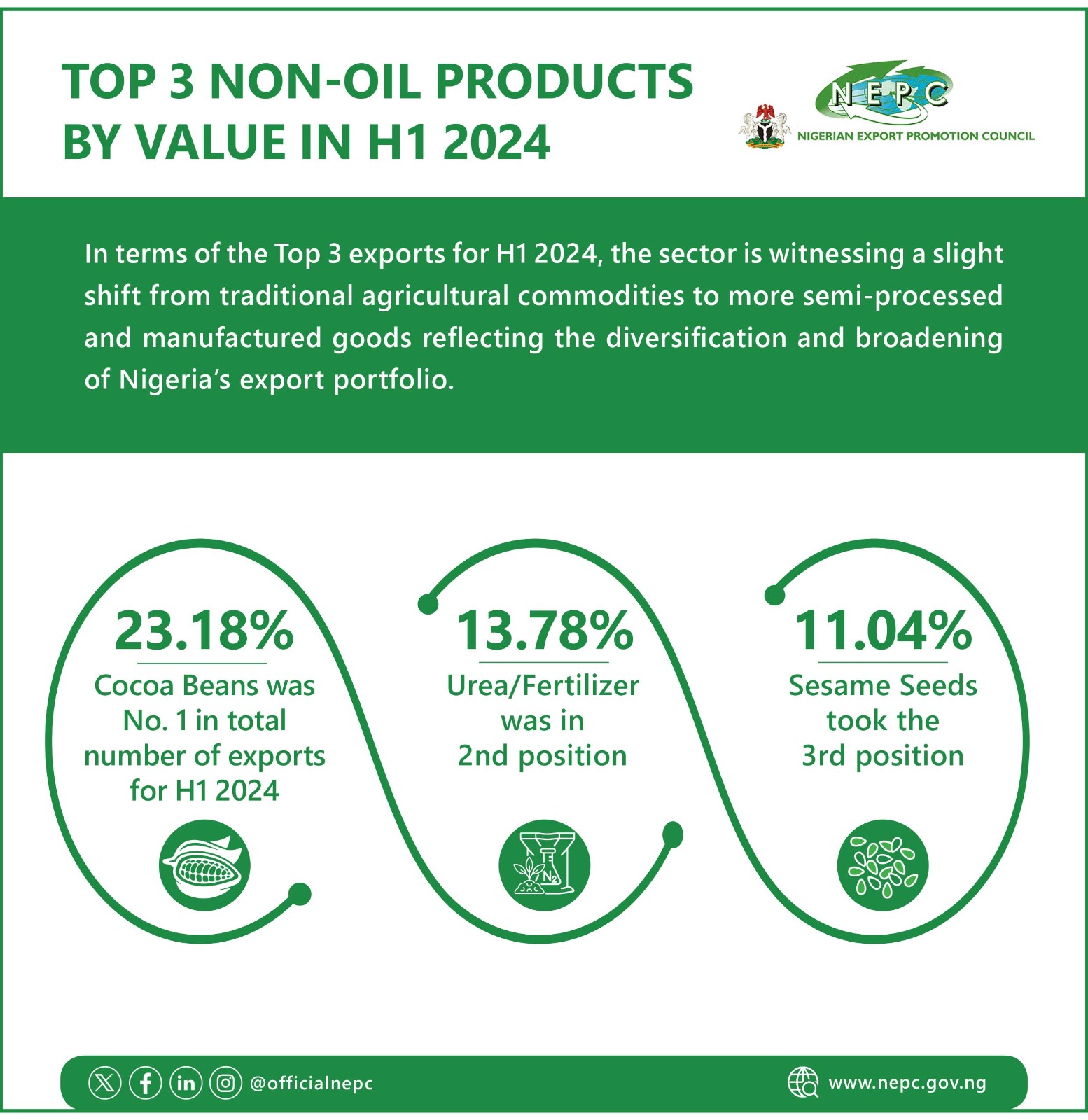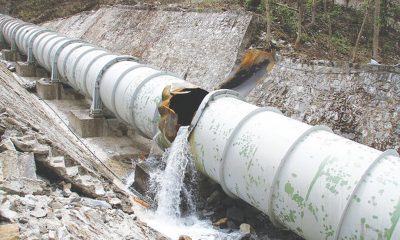Business
Diversification: Nigeria rakes in $2.7bn from non-oil exports in the first half of 2024

Diversification: Nigeria rakes in $2.7bn from non-oil exports in the first half of 2024
Nonye Ayeni, executive director and chief executive officer of the Nigerian Export Promotion Council (NEPC) says Nigeria recorded total receipts of $2.7bn from non-oil exports in the first half of 2024.
Ayeni made the disclosure in Abuja on Wednesday August 28, 2024 while addressing the media at the council’s presentation of its progress report on the non-oil sector performance for the first half of 2024.
The figure, she noted, represented a 6.26 percent increase compared to the $2.53 billion earned in the same period in 2023.
Nonye Ayeni attributed the growth to “the successful transition of government in May 2023 which brought about stability in the government, increase in demand for Made-in-Nigeria products and initiatives embarked on at the council…to reawaken the consciousness of Nigerians on the need to imbibe an export culture.”
She said the growth in non-oil export receipts underlines the ongoing efforts to grow the non-oil sector and diversify the economy from the mono-cultural dependence on oil in alignment with the Industrial Revitalization Plan of the Honourable Minister of Industry, Trade and Investment, Dr Doris Uzoka-Anite and the Renewed Hope Agenda of His Excellency, President Bola Ahmed Tinubu (GCFR).
Speaking on some of the initiatives introduced by the council, Ayeni noted that the council has a new mantra “Operation Double Your Exports” with the core objective of “significantly increasing our non-oil exports to improve our foreign exchange earnings and for economic growth and job creation.”
She also cited other initiatives like “Export 35 Redefined” through which the Council has selected the top 20 agricultural products to focus on right from the farm gate through the entire value chain to market access with NEPC CONNECT, the council’s result-driven customer service team facilitating the interaction between exporters and the Council.
Breaking down the product profile and market reach, Ayeni said a total of 211 different products were exported during this period with cocoa beans, urea/fertiliser and sesame seeds as the top 3 products with a contribution of 23.18 percent, 13.78 percent and 11.04 percent of the total non-oil exports for the period. She noted that this is indicative of “a shift from traditional agricultural commodities to more semi-processed and manufactured goods.”
The total volume of exported products stood at 3,834,333.83 metric tonnes thus reaffirming, in her words “the widely held assertion that the non-oil sector holds the key to the revitalization of the country’s economy.”
Nigeria’s non-oil exports were exported to 122 countries spread across Africa, the Americas, Asia, Europe, and Oceania regions. The top 3 destinations were Netherlands, Malaysia, and Brazil based on value with Ghana emerging the only African country in the top 15 global importers from Nigeria.
To reach global markets, Nigerian exporters utilized 19 exit points made up of Seaports, International Airports, and Land Borders. 95.08% of the total non-oil exports were routed through seaports with the South-West and South-South accounting for over 95 percent of the total non-oil exports during the period in review.
Highlighting the contribution of Nigerian manufacturing concerns, Ayeni noted in her address that the top 3 companies by contribution are Indorama-Eleme Fertiliser and Chemical Limited which led with $198.8 million in exports; Starlink Global and Ideal Limited with $184.7 million, and Outspan Nigeria Limited with $177.75 million.
She also singled out other notable contributors to include Dangote Fertiliser Limited and Metal Recycling Industries Limited.
Thirty two banks contributed to non-oil export transactions in H1 2024. Zenith Bank Plc dominated in terms of financial support to the non-oil export sector. The bank handled 43.09 per cent of the total Non-Oil Export Proceeds (NXPs). It was followed by First Bank Nigeria Plc and Fidelity Bank which handled 6.56 per cent and 6.38 percent of Non-Oil Export Proceeds (NXPs) respectively.
Concluding her address, Nonye Ayeni called on Nigerian banks to enhance exporters’ capacity and access to international markets by leveraging the opportunities in the non-oil export sector, particularly in light of the African Continental Free Trade Area (AfCFTA).
Business
Nigeria’s Inflation Drops to 15.10% as NBS Reports Deflationary Trend

Nigeria’s headline inflation rate declined to 15.10 per cent in January 2026, marking a significant drop from 27.61 per cent recorded in January 2025, according to the latest Consumer Price Index (CPI) report released by the National Bureau of Statistics.
The report also showed that month-on-month inflation recorded a deflationary trend of –2.88 per cent, representing a 3.42 percentage-point decrease compared to December 2025. Analysts say the development signals easing price pressures across key sectors of the economy.
Food inflation stood at 8.89 per cent year-on-year, down from 29.63 per cent in January 2025. On a month-on-month basis, food prices declined by 6.02 per cent, reflecting lower costs in several staple commodities.
The data suggests a sustained downward trajectory in inflation over the past 12 months, pointing to improving macroeconomic stability.
The administration of President Bola Ahmed Tinubu has consistently attributed recent economic adjustments to ongoing fiscal and monetary reforms aimed at stabilising prices, boosting agricultural output, and strengthening domestic supply chains.
Economic analysts note that while the latest figures indicate progress, sustaining the downward trend will depend on continued policy discipline, exchange rate stability, and improvements in food production and distribution.
The January report provides one of the clearest indications yet that inflationary pressures, which surged in early 2025, may be moderating.
Bank
Alpha Morgan to Host 19th Economic Review Webinar

Alpha Morgan to Host 19th Economic Review Webinar
In an economy shaped by constant shifts, the edge often belongs to those with the right information.
On Wednesday, February 25, 2026, Alpha Morgan Bank will host the 19th edition of its Economic Review Webinar, a high-level thought leadership session designed to equip businesses, investors, and individuals with timely financial and economic insight.
The session, which will hold live on Zoom at 10:00am WAT and will feature economist Bismarck Rewane, who will examine the key signals influencing Nigeria’s economic direction in 2026, including policy trends, market movements, and global developments shaping the local landscape.
With a consistent track record of delivering clarity in uncertain times, the Alpha Morgan Economic Review continues to provide practical context for decision-making in a dynamic environment.
Registration for the 19th Alpha Morgan Economic Review is free and can be completed via https://bit.ly/registeramerseries19
It is a bi-monthly platform that is open to the public and is held virtually.
Visit www.alphamorganbank to know more.
Business
GTBank Launches Quick Airtime Loan at 2.95%

GTBank Launches Quick Airtime Loan at 2.95%
Guaranty Trust Bank Ltd (GTBank), the flagship banking franchise of GTCO Plc, Africa’s leading financial services group, today announced the launch of Quick Airtime Loan, an innovative digital solution that gives customers instant access to airtime when they run out of call credit and have limited funds in their bank accounts, ensuring customers can stay connected when it matters most.
In today’s always-on world, running out of airtime is more than a minor inconvenience. It can mean missed opportunities, disrupted plans, and lost connections, often at the very moment when funds are tight, and options are limited. Quick Airtime Loan was created to solve this problem, offering customers instant access to airtime on credit, directly from their bank. With Quick Airtime Loan, eligible GTBank customers can access from ₦100 and up to ₦10,000 by dialing *737*90#. Available across all major mobile networks in Nigeria, the service will soon expand to include data loans, further strengthening its proposition as a reliable on-demand platform.
For years, the airtime credit market has been dominated by Telcos, where charges for this service are at 15%. GTBank is now changing the narrative by offering a customer-centric, bank-led digital alternative priced at 2.95%. Built on transparency, convenience and affordability, Quick Airtime Loan has the potential to broaden access to airtime, deliver meaningful cost savings for millions of Nigerians, and redefine how financial services show up in everyday life, not just in banking moments.
Commenting on the product launch, Miriam Olusanya, Managing Director of Guaranty Trust Bank Ltd, said: “Quick Airtime Loan reflects GTBank’s continued focus on delivering digital solutions that are relevant, accessible, and built around real customer needs. The solution underscores the power of a connected financial ecosystem, combining GTBank’s digital reach and lending expertise with the capabilities of HabariPay to deliver a smooth, end-to-end experience. By leveraging unique strengths across the Group, we are able to accelerate innovation, strengthen execution, and deliver a more integrated customer experience across all our service channels.”
Importantly, Quick Airtime Loan highlights GTCO’s evolution as a fully diversified financial services group. Leveraging HabariPay’s Squad, the solution reinforces the Group’s ecosystem proposition by bringing together banking, payment technology, and digital channels to deliver intuitive, one-stop experiences for customers.
With this new product launch, Guaranty Trust Bank is extending its legacy of pioneering digital-first solutions that have redefined customer access to financial services across the industry, building on the proven strength of its widely adopted QuickCredit offering and the convenience of the Bank’s iconic *737# USSD Banking platform.
About Guaranty Trust Bank
Guaranty Trust Bank (GTBank) is the flagship banking franchise of GTCO Plc, a leading financial services group with a strong presence across Africa and the United Kingdom. The Bank is widely recognized for its leadership in digital banking, customer experience, and innovative financial solutions that deliver value to individuals, businesses, and communities.
About HabariPay
HabariPay is the payments fintech subsidiary of GTCO Plc, focused on enabling fast, secure, and accessible digital payments for individuals and businesses. By integrating payments and digital technology, HabariPay supports innovative services that make everyday financial interactions simpler and more seamless.
Enquiries:
GTCO
Group Corporate Communication
[email protected]
+234-1-2715227
www.gtcoplc.com
-

 celebrity radar - gossips6 months ago
celebrity radar - gossips6 months agoWhy Babangida’s Hilltop Home Became Nigeria’s Political “Mecca”
-

 society6 months ago
society6 months agoPower is a Loan, Not a Possession: The Sacred Duty of Planting People
-

 society5 months ago
society5 months agoReligion: Africa’s Oldest Weapon of Enslavement and the Forgotten Truth
-

 news6 months ago
news6 months agoTHE APPOINTMENT OF WASIU AYINDE BY THE FEDERAL GOVERNMENT AS AN AMBASSADOR SOUNDS EMBARRASSING








